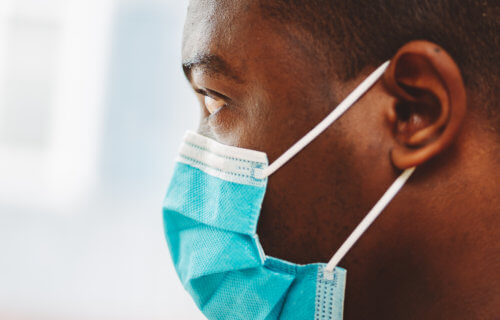BETHESDA, Md. — By now, most people are aware that wearing a face mask helps the wearer protect themselves and the people around them from coronavirus infection. With that in mind, a potentially groundbreaking new study is suggesting face masks offer another major pandemic benefit. Researchers from the National Institutes of Health have collected evidence indicating that wearing a mask will also foster less severe COVID-19 symptoms in the event of infection.
How is this possible? Humidity. Study authors say the humidity generated inside a face mask helps combat respiratory diseases. Whenever anyone wears a mask, that act increases the levels of humidity in the air they breathe in. The extra humidity supplied by wearing a mask may explain how mask-wearing can create more manageable COVID-19 symptoms.
Previous studies have revealed that additional hydration in the respiratory system helps improve immune responses.
“We found that face masks strongly increase the humidity in inhaled air and propose that the resulting hydration of the respiratory tract could be responsible for the documented finding that links lower COVID-19 disease severity to wearing a mask,” says lead study author and NIH Distinguished Investigator Adriaan Bax, Ph.D. in a media release. “High levels of humidity have been shown to mitigate severity of the flu, and it may be applicable to severity of COVID-19 through a similar mechanism.”
Your lungs love the humidity when you’re sick
More humidity helps the lungs in a few different ways. High humidity levels make it harder for viruses to spread in the lungs by facilitating mucociliary clearance (MCC). This is an immune defense response that removes mucus and any harmful particles hiding in that mucus. Extra humidity also causes the immune system to create special virus-fighting proteins called interferons.
Conversely, not enough humidity can lead to less than adequate MCC/interferon responses. Researchers believe this is one of the main reasons people tend to develop respiratory infections during the winter.
Study authors tested four popular face mask varieties during this study; a three-ply disposable surgical mask, a two-ply cotton-polyester mask, a heavy cotton mask, and a N95 mask. The team measured humidity by having volunteers breathe into a sealed steel box. When participants did this with no mask on, their exhalation quickly filled the box with water vapor, subsequently causing humidity to rise rapidly in the box.
However, when that same action took place with a mask on, humidity buildup in the box decreased significantly. This is because most of the water vapor stays in the mask, where it is eventually inhaled again.
Which mask is best for lung humidity?
All four tested mask varieties increased inhaled humidity levels considerably, but the thick cotton mask induced the highest humidity levels.
“The increased level of humidity is something most mask-wearers probably felt without being able to recognize, and without realizing that this humidity might actually be good for them,” Bax says.
“Even as more people nationwide begin to get vaccinated, we must remain vigilant about doing our part to prevent the spread of the coronavirus that causes COVID-19,” concludes NIDDK Director Dr. Griffin P. Rodgers. “This research supports the importance of mask-wearing as a simple, yet effective, way to protect the people around us and to protect ourselves from respiratory infection, especially during these winter months when susceptibility to these viruses increases.”
The study is published in Biophysical Journal.
